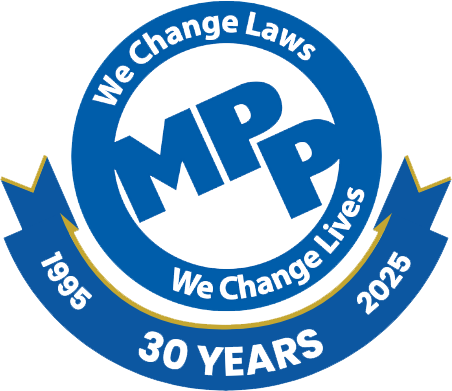- Take Action: Urge your state legislators to support a compassionate medical cannabis program!
Press Release
Voters in Nine States Will Decide Whether to Roll Back Marijuana Prohibition on Tuesday
FOR IMMEDIATE RELEASE
Friday, November 4, 2016
Contact: Violet Cavendish
vcavendish@mpp.org
Representatives from the Marijuana Policy Project — which is playing a leading role in several of the initiative efforts and an assisting role in the others — will be available for interviews leading up to Election Day, throughout Election Night, and in the days that follow
On Wednesday at 12 p.m. ET, Congressman Earl Blumenauer will join the Marijuana Policy Project for a national media teleconference to discuss the outcome of the election and answer questions about what to expect next at the federal and state levels
WASHINGTON — Voters in nine states will decide whether to roll back marijuana prohibition on Tuesday, marking the biggest Election Day in history for marijuana policy reform.
Five states — Arizona, California, Maine, Massachusetts, and Nevada — are voting on ballot initiatives to regulate and tax marijuana similarly to alcohol for adult use. Three states — Arkansas, Florida, and North Dakota — are voting on measures that would establish new laws that regulate medical marijuana. Montana is voting on a measure that would re-establish patients’ access to medical marijuana providers, which was hindered by state lawmakers, and create a more regulated system of medical marijuana production and distribution. See links below for more information about each of the initiatives.
Representatives from the Marijuana Policy Project (MPP) will be available for interviews leading up to Election Day, throughout Election Night, and in the days that follow. MPP is the nation’s largest marijuana policy organization, and it is playing a leading role in several of the initiative efforts and an assisting role in the others.
On Wednesday at 12 p.m., Congressman Earl Blumenauer (D-OR), a leading advocate for changes to federal drug laws, will join MPP for a national media teleconference to discuss the outcome of the election and to answer questions about what to expect next at the federal and state levels. RSVP to media@mpp.org to receive instructions for participating in the teleconference.
Alaska, Colorado, Oregon, and Washington have adopted laws that legalize, regulate, and tax marijuana for adult use, and the District of Columbia has removed all penalties for private possession and cultivation of limited amounts of marijuana. Twenty-five states have adopted comprehensive medical marijuana laws that allow patients with certain qualifying conditions to access medical marijuana if their doctors recommend it.
Statement from MPP Director of Communications Mason Tvert:
“The record-high number of states voting on marijuana policy this year reflects the record-high level of public support we are seeing for ending marijuana prohibition. Voters from San Diego, California to Portland, Maine agree it is time to stop punishing adults for using marijuana. An even larger majority of Americans support legal access to medical marijuana, including both major party presidential candidates.
“These ballot measures are all big steps forward for the marijuana policy reform movement regardless of their outcome on Election Day. They have led to an invaluable public dialogue about marijuana, the harms caused by its prohibition, and the benefits of adopting a more sensible approach. The debate is steadily shifting from whether marijuana should be ‘legalized’ to how it can best be regulated and taxed for medical and adult use.”
For information about each of the ballot initiatives:
Arizona Proposition 205 – https://www.regulatemarijuanainarizona.org
California Proposition 64 – http://www.yeson64.org
Maine Question 1 – https://www.regulatemaine.org
Massachusetts Question 4 – https://www.regulatemassachusetts.org
Nevada Question 2 – https://www.regulatemarijuanainnevada.org
Arkansas Issue 6 – http://bit.ly/2f1Ygpe
Florida Amendment 2 – http://www.unitedforcare.org
North Dakota Measure 5 – http://www.yesonmeasure5.com
Montana Initiative 182 – http://www.yeson182.org
###
Founded in 1995, the Marijuana Policy Project (MPP) is the nation’s leading cannabis policy reform organization. MPP has played a central role in passing dozens of cannabis policy reforms in states across the country, including 14 successful cannabis legalization campaigns, and also works to advance federal reforms.
